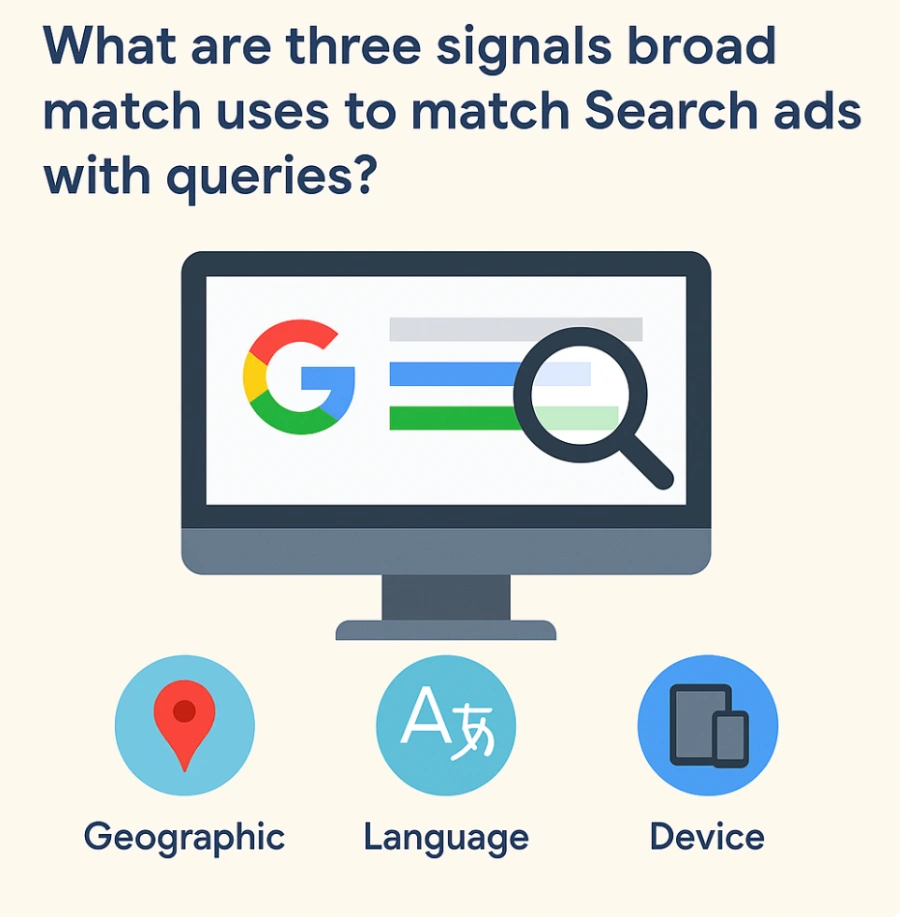What are three signals broad match uses to match Search ads with queries?
- Interests
- Smart Bidding
- Geographic
- Language
- Device
The correct answers are:
✅ Geographic
✅ Language
✅ Device

Full overview: Why correct and other incorrects?
✅ Correct Answers:
Broad Match in Google Ads uses real-time signals to better match your Search ads to relevant queries, especially when combined with Smart Bidding.
Here are the three correct signals used in Broad Match targeting:
1. ✅ Geographic (Location):
Google Ads considers the user’s location to match your ad with relevant local or regional search queries.
Example:
If your keyword is “plumber” and a user searches from Miami, Broad Match could trigger your ad for “emergency plumber near me” — even if “Miami” isn’t in the keyword list — because the user’s location matches your target area.
2. ✅Language:
Google matches the language setting of the user’s browser or device with the language targeting in your campaign.
Example:
If your campaign targets English and a user searches in English, your ad is more likely to be shown — even if the exact keyword isn’t typed.
3. ✅ Device:
Google evaluates the device type (mobile, tablet, desktop) to better understand the user’s context and tailor ad delivery accordingly.
Example:
A user searching “best sushi near me” from a mobile device might trigger an ad with mobile-optimized extensions (like call or directions), even if the keyword just includes “sushi.”
❌ Why the Other Options Are Incorrect:
| Option | Why It’s Incorrect |
|---|---|
| Interests | ❌ Interests are used in Display and YouTube campaigns, not for Search network targeting. |
| Smart Bidding | ❌ Smart Bidding is a bidding strategy, not a signal Broad Match uses to match queries. It works in tandem with Broad Match but isn’t itself a matching signal. |
Full Summary:
| Signal | Used in Broad Match? | Role |
|---|---|---|
| ✅ Geographic | Yes | Matches user’s location to relevant keywords |
| ✅ Language | Yes | Aligns ad delivery with user language settings |
| ✅ Device | Yes | Tailors ad delivery to user’s device type |
| ❌ Interests | No | Used in Display/Video targeting, not Search |
| ❌ Smart Bidding | No | A bidding strategy, not a matching signal |
Additional Resources:
- Google Ads Help – Match types and Broad Match behavior
- Broad Match + Smart Bidding Best Practices
- Google keyword matching
Conclusion:
Broad Match in Google Ads uses real-time signals like device, location, and language to better understand search intent and show ads for relevant variations of your keywords.
✅ Use Broad Match with Smart Bidding for the widest reach with intelligent targeting.
FAQs:
Q: Can Broad Match still match unrelated queries?
A: Not usually — when paired with Smart Bidding, Broad Match prioritizes high-intent, contextually relevant searches.
Q: Are these signals adjustable?
A: No, they’re used automatically by Google’s algorithm in the background.
Q: Is it better to use Broad Match or Phrase Match?
A: Broad Match offers more reach but requires Smart Bidding for best results. Phrase Match offers more control.
Now, if you are ready, then you take the Google Skillshop test for the Google Ads Search Exam. If you want more questions about the Google Ads Search Certification Exam, follow.

